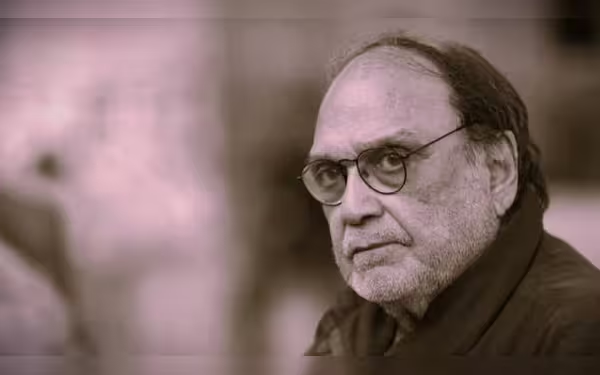Sunday, December 22, 2024 09:12 PM
Khaled Ahmed: A Pillar of Pakistani Journalism
- Khaled Sb's impact on Pakistani journalism is profound.
- He navigated complex political landscapes with insight.
- Khaled Sb fostered mentorship and intellectual curiosity.
 Image Credits: thefridaytimes
Image Credits: thefridaytimesKhaled Ahmed, a key figure in Pakistani journalism, shaped public discourse through mentorship and insightful commentary on global affairs.
Khaled Ahmed, affectionately known as Khaled Sb, is a figure who has left an indelible mark on the landscape of journalism in Pakistan. His journey began in the bustling city of Lahore in 2003, where he quickly became a prominent voice in the media. With a distinctive style and a wealth of knowledge, Khaled Sb has navigated the complexities of reporting, particularly during tumultuous times marked by the War on Terror and Pakistan's intricate political landscape.
Upon first encountering Khaled Sb at the Daily Times newsroom, one might have been intimidated by his gruff exterior. He was often seen hunched over a rucksack filled with books, dressed in a simple polo shirt and tracksuit bottoms. However, beneath this unassuming appearance lay a brilliant mind, deeply engaged in the world of journalism. His reputation preceded him, with many warning newcomers to tread carefully around him. Yet, for those willing to engage, Khaled Sb was a treasure trove of insights and knowledge.
As a young journalist, the author of this piece found themselves in awe of Khaled Sb's intellectual prowess. The newsroom was a battleground of ideas, with tensions running high between editorial staff and reporters. Khaled Sb, with his keen eye for detail, had a well-known aversion to subeditors altering his work. This was evident during a particularly tense moment when a misunderstanding arose over an article. Khaled Sb's initial frustration quickly turned to sheepishness upon realizing that the error was not the author's fault, showcasing his humanity behind the stern facade.
Despite being assigned to the foreign desk, the author often found themselves drawn to Khaled Sb's editorial pieces, particularly those addressing Pakistan's role in global affairs. The discussions that ensued during their impromptu meetings in his office were enlightening. Khaled Sb was not just a mentor; he was a thinker who challenged the status quo. His views on the political landscape, especially regarding the West's influence in Pakistan, were thought-provoking and often sparked lively debates.
One memorable exchange revolved around the Iraq War and its implications for Pakistan. Khaled Sb's perspective was clear: the country needed to navigate its relationship with the West carefully, especially in the face of rising extremism. His serious tone, often lightened by a smile, made these discussions both engaging and educational. The author, in turn, found themselves defending their views with a cheeky confidence, illustrating the dynamic nature of their interactions.
These encounters were not just about journalism; they were about understanding the world through a different lens. Khaled Sb's ability to challenge ideas while fostering a sense of camaraderie made him a beloved figure in the newsroom. The shared moments, whether discussing politics or enjoying a cigarette together, highlighted the importance of mentorship in journalism.
Khaled Ahmed stands as a testament to the power of journalism in shaping public discourse. His journey reflects the challenges and triumphs faced by many in the field. For aspiring journalists, Khaled Sb's story serves as a reminder of the importance of intellectual curiosity, the courage to engage in difficult conversations, and the value of mentorship. As the media landscape continues to evolve, figures like Khaled Sb will remain crucial in guiding the next generation of journalists toward a more informed and engaged society.













